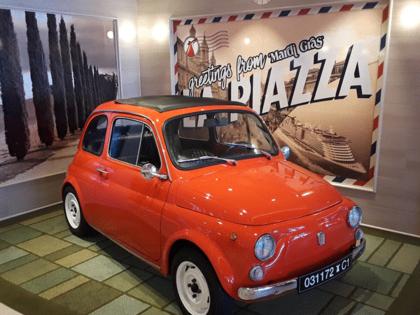Collectors feel relief as classic cars evade Trump's auto tariffs
Published in News & Features
President Donald Trump’s sweeping tariff plan has rocked global markets, with every single sector in the S&P 500 ending Friday in deep red. But one turgid addendum issued by U.S. Customs and Border Protection just after his April 2 tariff pronouncement provided relief for those in the collectible car business: Vintage cars would be exempt.
Collectors, brokers and logistics specialists had feared the worst when Trump’s March 26 executive order saddled vehicles and auto parts with new 25% tariffs, a tax that would be in addition to the current 2.5% rate and didn’t include any exemptions for used and classic cars.
New customs guidance now outlines a special exemption for “passenger vehicles and light trucks from all countries … manufactured in a year at least 25 years prior to the year of the date of entry.” The old Alfa Romeos and BMWs, Ferraris and Fiats that enthusiasts love to discover abroad can still be sent back home at current rates.
Martin Button, global brand ambassador for CARS, a classic automotive relocation service, had been on the edge of his seat all week. “It’s good news!” he crowed on the phone that evening after receiving an email outlining the exemption.
“We remain hopeful that this move by the US government will influence the importance of classic cars worldwide,” Dmitriy Shibarshin, the global marketing director for West Coast Shipping, said in a statement about the result.
Vintage car fanciers had worried the lack of an exemption would decimate large swaths of an industry that includes 43 million classic cars in the U.S. and a combined value of more than $1 trillion, according to data from insurance provider Hagerty Inc. Auction houses would lose international consigners adverse to paying extra just to sell their cars at the annual sales in Monterey, California; restorers and rebuilders would lose clients frustrated with the rising costs of parts and associated delays for their vintage toys.
On March 27, lawyers from Simon Gluck & Kane LLP had sent a letter to U.S. Trade Representative Jamieson Greer outlining the reasons why an exemption should be applied for certain used automobiles, race cars and parts. Increased duties discourage imports, stripping local and national jurisdictions of tax revenue, it said; the $10 million sale of a collectible car at a rate of 7% generates sales taxes of $700,000.
“Not only would the US Treasury be deprived of the 25% duties which would not be paid,” wrote Christopher Kane, an attorney who specializes in ocean transport and compliance audit procedures at Simon Gluck & Kane, “but the state would be deprived of significant irreplaceable sales tax revenue.”
In California, Button had anticipated turning around full shipments of cars if the exemption didn’t come through.
Jay Bullock, director of global special projects at Silver Tiger Logistics, imagined that his weekly Saturday flight of vehicles would be empty; he had already paused transport on a stockpile of cars in anticipation of the ruling. The shipper with offices in Georgia, the U.K. and the Netherlands imports roughly 1,000 collectible cars into the U.S. annually, with the total value aboard some single flights exceeding $100 million.
Meanwhile, the late-hour addition had Boston-based automotive broker Steve Serio breathing a sigh of relief. He had been eyeballing his former 1985 Aston Martin V8 Vantage for sale at an RM Sotheby’s auction next month in Milan, hoping to buy back the silver bullet baby he sold in 2010. But the proposed tariff would have tacked on an additional €50,000 ($54,270) to its €200,000 high-estimate value. “The extra 25% kills the deal.” Now, it’s either that or a mint 1970 Bentley T1, he says.
But the coast isn’t totally clear for all enthusiasts of collectible coaches. The carve-out doesn’t protect later-model used vehicles. Those, whether they’re 2010 Nissan GT-Rs from Japan or 2020 Mercedes-AMG C63s from Germany, will be subject to the hefty new tariffs.
“Welcome to the Wild West,” Kane said in an email on April 4. “Somehow present circumstances in the world of US tariff policy have so many rules one might wonder just how many there are and if they are capable of being ‘top of mind’ in anyone’s head.”
Those looking for a silver lining will find that the new fees effectively raise the value of similar vehicles already stateside, says John Draneas, an Oregon attorney with a monthly “Legal Files” column in Sports Car Market magazine. It’s simple economics: “If importing a car from Europe is going to cost 25% more, the cars in this country are going to be worth more.”
©2025 Bloomberg L.P. Visit bloomberg.com. Distributed by Tribune Content Agency, LLC.







Comments